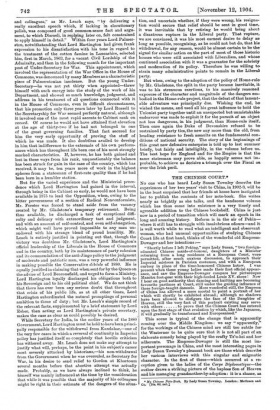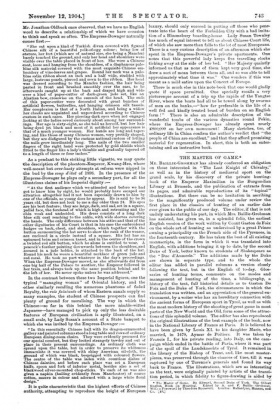No one who has heard Lady Susan Townley 'describe the
experiences of her two years' visit to China, in 1902-3, will be in the least surprised that her friends at home have instigated her to publish the contents of her note-book. She writes.
nearly as brightly as she talks, and the handsome volume which has thus come into existence is a very timely and agreeable addition to the Chinese bookshelf. China is just. now in a period of transition which will mark an epoch in its- long and amazing history. Reform is in the air of Pekin— where it still has to struggle with insalubrious odours—and it- is well worth while to read what an intelligent and observant woman, who had unusual opportunities of studying Chinese Court life at first hand, thinks of the wonderful old Empress- Dowager and her intentions :-
" Shortly before I left Peking," says Lady Susan, "two foreign- educated Chinese maids-of-honour, daughters of a Minister returning from a long residence at a European Court, were permitted, after much anxious discussion, to approach their Imperial mistress in Parisian costumes, and with a European. curtsey in place of the time-honoured Chinese kotow. I was present when these young ladies made their first official appear- ance, and saw the Empress-Dowager compare her picturesque Manchu foot-gear with their high-heeled Louis XV. shoes ! Now I hear on good authority that dancing and knitting are becoming favourite pastimes at Court, still under the guiding influence of these foreign-taught damsels. More wonderful still, the Empress of China has allowed a mere mortal to paint a portrait of her which will shortly be exhibited abroad; although no shadows. have been allowed to disfigure the face of the Daughter of: Heaven, still the very fact of this portrait existing may serve with others to prove that the Chinese Court has entered- upon the first stage of that evolution by which, like the Japanese,. it will gradually be transformed and Europeanised."
This scene is typical of the change that is apparently coming over the Middle Kingdom : we say " apparently,"'
for the workings of the Chinese mind are still too subtle for the Westerner to be quite sure that it is not all part of an elaborate comedy being played by the crafty Tz'u-hsi and her
adherents. The Empress-Dowager is still the most im- portant personage in China, and the most interesting pages in. Lady Susan Townley's pleasant book are those which describe her various interviews with this singular and enigmatic
character. In the first of these—which occurred at a re- ception given to the ladies of the Corps Diplomatique—the author draws a striking picture of the hapless Son of Heaven
and his managing grandmother-by-adoption : itis'a shame, as.
* My Chinese Note-Book. By Lady Susan Townley. London : *alum and Co. ROL 6d. net.3
Mr. Jonathan Oldbuck once observed, that we have no English word to describe a relationship of which we have occasion to think and speak so often. The Empress-Dowager naturally comes first:-
" She sat upon a kind of Turkish divan covered with figured Chinese silk of a beautiful yolk-of-egg colour; being low of stature, her feet (which are of natural size, she being a Manchu) barely touched the ground, and only her head and shoulders were visible over the table placed in front of her. She wore a Chinese coat, loose and hanging from the shoulders, of a diaphanous pale- blue silk material covered with the most exquisite Chinese em- broidery of vine-leaves and grapes. Round her neck was a pale- blue satin ribbon about an inch and a half wide, studded with large, lustrous pearls, pierced and sewn to the ribbon. Her head was dressed according to the Manchu fashion, the hair being parted in front and brushed smoothly over the ears, to be afterwards caught up at the back and draped high and wide over a kind of paper-cutter of dark-green jade set, like an Alsatian bow, crosswise on the summit of the head. The ends of this paper-cutter were decorated with great bunches of artificial flowers, butterflies, and hanging crimson silk tassels. Her complexion is that of a North Italian, and being a widow her cheeks are unpainted and unpowdered according to Chinese custom in such cases. Her piercing dark eyes when not engaged looking at the ladies roved curiously about among her surround- ings. Her age is sixty-eight, as she told us herself, but her hair being dyed jet black and most of it artificial her appearance is that of a much younger woman. Her hands are long and taper- ing, and like those of many Chinese women, very prettily shaped, but they are disfigured by the curious national custom of letting the nails grow inordinately long. The nails of the two smaller fingers of the right hand were protected by gold shields which fitted to the finger like a lady's thimble and gradually tapered off to a length of three or four inches."
As a pendant to this striking little vignette, we may quote the description of the phantom-Emperor, Kwang-Hsu, whose well-meant but over-hasty attempts at reform were nipped in the bud by the coup d'gtat of 1898. In the presence of the Empress-Dowager he plays only a secondary part, for all the illustrious claims of his Imperial dignity :— " At the first audience which we attended and before we had got to know him by sight, he would probably have escaped our attention altogether had it not been especially drawn to him by .one of the officials, so young does he appear. He is said to be 36 _years old, but does not look to me a day older than 24. His eyes are his best feature; they are large, dark, and sad, set in a square, pallid face, the forehead of which is high and retreating and the chin weak and undecided. His dress consists of a long dark blue silk coat reaching to the ankle, with wide sleeves covering the hands. The only difference between his attire and that of the other dignitaries of his Court is that in his case the embroidered badges on back, chest, and shoulders, which together with the button surmounting the hat serve to show the rank of the wearer, are enclosed in a circle instead of a square. His hat has an upturned brim and crimson tassel, and in the centre of the crown a twisted red silk button, which he alone is entitled to wear. A peacock's feather pointing downwards between the shoulders, and secured in a jade holder, is attached to the back of the hat. Round his neck he wears a beautiful necklace of green jade and red coral. He took no part- whatever in the day's proceedings. When the Empress-Dowager moved, as she afterwards did from one big hall of the Palace to another, the Emperor followed in her train, and always took up the same position behind and to the left of her. He never spoke unless he was addressed."
In the contrast between these two Imperial figures, one the typical "managing woman" of Oriental history, and the other similarly recalling the numerous phantoms of faded Royalty, the rois fainéants of whom Eastern annals supply so many examples, the student of Chinese prospects can find plenty of ground for moralising. The way in which the Chinese—so far in this behind the more nimble-witted Japanese—have managed to pick up only the less desirable features of European civilisation is aptly illustrated, on a .small scale, by Lady Susan's account of a State banquet to which she was invited by the Empress-Dowager :— "In this essentially Chinese hall with its dragon-ornamented gallery and painted columns stood a long table and rows of ordinary European dining-room chairs. They were evidently procured for our special comfort, but they looked strangely tawdry and out of place in their present surroundings. An ordinary cloth was -spread upon the table, but in order to preserve its whiteness immaculate it was covered with shiny American oil-cloth, the ground of which was black, besprigged with coloured flowers. The centre of the table was laden with countless dishes of Chinese dainties, and before each place was set a European knife, spoon and fork of inferior metal, besides also a set of blackwood silver-mounted chop-sticks. To each of us was also given a napkin (hailing evidently from Manchester) of coarse cotton, mauve in colour and adorned with a large white floral design."
It is quite characteristic that the highest efforts of. Chinese authority, attempting to reproduce the height of European luxury, should only succeed in putting off those who pene- trate into the heart of the Forbidden City with a bad imita- tion of a Bloomsbury boarding-house. Lady Susan Townley has much of equal interest to tell us about Chinese Court life, of which she saw more than falls to the lot of most Europeans. There is a very curious description of an afternoon which she spent in the Empress-Dowager's private apartments. One notes that this powerful lady keeps five travelling clocks ticking away at the side of her bed. " Her Majesty quaintly informed us that as none of them kept very good time, she drew a sort of mean between them all, and so was able to tell approximately what time it was." One wonders if this was meant as a mild satire upon the Concert of Europe.
There is much else in this note-book that one would gladly quote if space permitted. One specially recalls a very picturesque account of a trip up the rapids of the Yangtse River, where the boats had all to be towed along by swarms of men on the banks,—" how far preferable is the life of a well fed and kindly treated beast of burden on an English farm ! " There is also an admit-able description of the wonderful tombs of the various dynasties round Pekin, where the Empress-Dowager has already spent nearly £800,000 on her own monument ! Many sketches, too, of ordinary life in China confirm the author's verdict that " the people of China are excellent," and that they afford promising material for regeneration. In short, this is both an enter- taining and an instructive book.











































 Previous page
Previous page